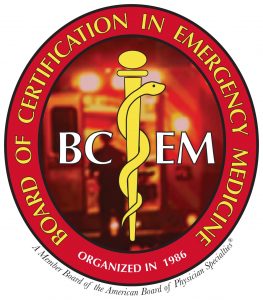What Is BCEM?
 The Board of Certification in Emergency Medicine (BCEM) offers qualified emergency department physicians the chance to demonstrate their skills and knowledge in emergency medicine through board certification and re-certification in the specialty. The BCEM is a Member Board of the American Board of Physician Specialties® (ABPS), one of three nationally distinguished physician board certifying bodies.
The Board of Certification in Emergency Medicine (BCEM) offers qualified emergency department physicians the chance to demonstrate their skills and knowledge in emergency medicine through board certification and re-certification in the specialty. The BCEM is a Member Board of the American Board of Physician Specialties® (ABPS), one of three nationally distinguished physician board certifying bodies.
BCEM Eligibility Requirements
To be eligible to apply for initial certification, candidates must satisfy the general requirements of the ABPS. These include being a graduate of a recognized U.S., Canadian, or international allopathic or osteopathic college of medicine, and holding a valid and unrestricted license to practice medicine in the United States, its territories, or Canada. The BCEM has its own eligibility requirements for three certification pathways that include:
- Completion of an ACGME, AOA, RCPSC, or CFPC-accredited residency in emergency medicine
- Completion of an ACGME, AOA, RCPSC, or CFPC residency in one of the following primary care specialties—family practice, internal medicine, pediatric medicine, or general surgery—and at least five years of full-time emergency medicine experience
- Completion of a 12- or 24-month emergency medicine fellowship approved by the BCEM
For a list of BCEM-approved fellowships, click here. The ABPS invites qualified physicians who have completed a BCEM-approved fellowship to apply for certification in emergency medicine. With more hospitals than ever relying on physician board certification as a way to identify qualified job candidates, BCEM certification serves to broaden career opportunities. BCEM Diplomates have access to a dedicated career portal that advertises a variety of job openings throughout the country.
To earn BCEM certification, candidates in all three pathways must pass both a written and oral examination. The computer-based written exam consists of 325 multiple-choice questions. Candidates must pass the written exam to take the oral component.
Once granted, all BCEM certification is good for eight years, expiring on December 31st of the eighth year.
Recertification in emergency medicine requires documentation of the required number of Continuing Medical Education (CME) hours, completion of the recertification application, and successful completion of the written recertification examination.
If you would like more information about becoming certified with the BCEM, contact the ABPS. We would be happy to give you details about our eligibility requirements as well as helpful tips on how to prepare for the certification exam.






